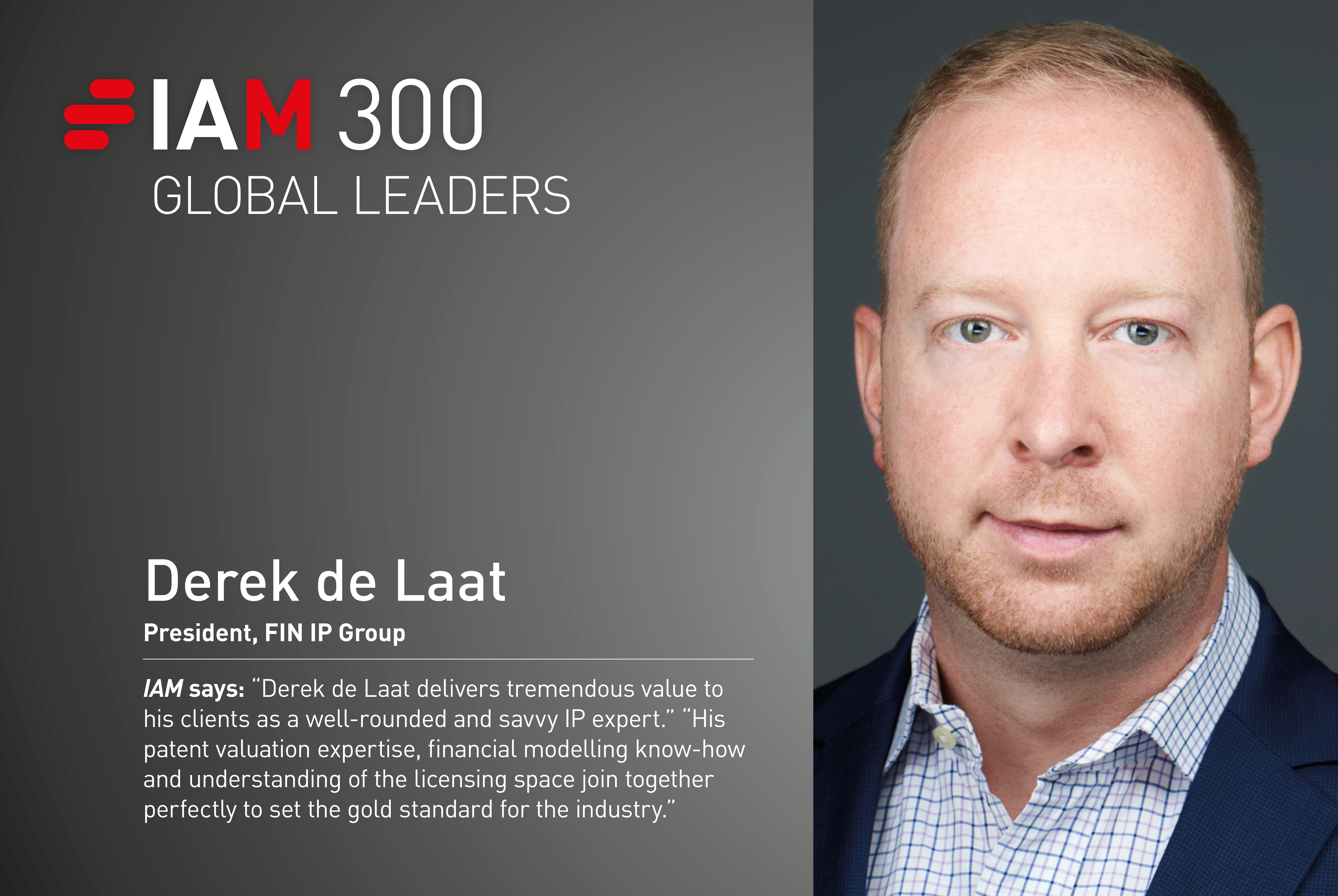Derek de Laat
Which patent monetisation deal that you have worked on are you most proud of and why?
Throughout my career specialising in IP licensing and finance, I have facilitated numerous notable deals working at Rockstar Consortium, BlackBerry, WiLAN and FIN IP Group. My work on M&A transactions, patent acquisitions/divestitures and licensing has honed my valuation and licensing expertise and expanded my network in the IP community.
Every deal has unique significance. I take pride in our firm’s work to support clients in closing their own deals and maximising the value of their intellectual property. We have helped facilitate over US$250 million in deals in the last year alone. We help clients to develop or fine tune their programme royalty rates, build new licensing programmes, value their intellectual property, determine licensing strategies and build out internal processes related to deal tracking and structure. Achieving results for them is the most rewarding part of my job.
You have over a decade of experience negotiating complex global IP deals. What common mistakes do parties make when embarking on negotiations – and how can they avoid them?
Complex global IP deals require rigorous financial analysis, which is glossed over too often. It is essential to have an expert partner to help increase the sophistication of economic analysis and mitigate errors throughout the transaction process.
Parties usually invest significantly in the legal and technical aspects of an IP deal but fail to allocate sufficient resources to crucial financial analysis required for running successful monetisation programmes. Examples of errors I see include:
- royalty rates that are chosen based on personal heuristics rather than pragmatism;
- business case analyses that are conducted in haste and not reviewed by peers or third-party experts; and
- economic presentations that are poorly thought out and presented and fail to understand the adversarial party’s position.
These factors can all lead to deal hold-out as neither party is able to appreciate or fully understand the deal’s value. It is especially vital as a licensor to put yourself in the licensee’s shoes and vice versa.
Our team works hard to help clients overcome these pitfalls. We have a structured approach to identifying the most accurate royalty bases, developing defensible rates, structuring effective terms and presenting in a concise, professional manner. A rigorous and thorough financial analysis benefits all stakeholders and should be a crucial element of every deal.
What, for you, are the most important steps of any intangible asset valuation process?
In valuation, choosing and applying the right valuation drivers and assumptions is critical. Mistakes often arise from an IP valuator’s lack of understanding and experience and can yield unreliable results. I see grievous errors in valuations resulting from the use of inputs that are not well understood. Actual examples that we have seen include the use of transactions with significant encumbrances as comparable transactions, application of out-of-date or irrelevant royalty rates and incorrect adjustment for foreign jurisdictions. Without experience and daily immersion in IP licensing, valuators are unable to reflect the realities of the industry in their inputs and therefore fail to appropriately value the intellectual property.
You have extensive experience of IP monetisation – how have attitudes to this shifted?
IP monetisation has evolved, growing more complex and requiring a high level of technical, legal and financial proficiency. This increasing complexity demands greater preparedness by licensors and licensees. There are now more tools, information and support options accessible than ever before. FIN IP knows how to leverage these to achieve client goals and solve problems more efficiently and effectively. Both licensors and licensees are required to possess high-level skills in all of these areas and be fully prepared to engage at the negotiating table.
Given that business leaders are not always conversant in finance or intellectual property, what tips can you share for engaging – and ensuring buy-in from – key stakeholders?
Business leaders usually agree that intellectual property is valuable and that an IP strategy would be nice to have, but in reality it is often considered a cost centre, representing major expenditures with unclear financial upsides. Obtaining C-Suite buy-in for IP investment or monetisation can be difficult, even if there is consensus that it is worthwhile.
In my opinion, the most compelling way to achieve buy-in is with a compelling, defensible business case that outlines investments, costs, potential upsides, realistic timelines and the opportunities that the intellectual property creates for the company. However, developing a good business case is only half the problem; presenting it effectively to senior management is sometimes the greater challenge.
Derek de Laat
President
President of Fin IP Group Derek de Laat brings over 15 years of experience in pioneering credible and advanced financial services in the IP market, having successfully structured numerous IP transactions, developed industry-leading financial models and played a key role in major IP licensing deals across various technology sectors. His achievements include creating over 500 patent acquisition models, facilitating deals surpassing $2 billion and assisting in raising patent portfolios and litigation financing exceeding $200 million.
